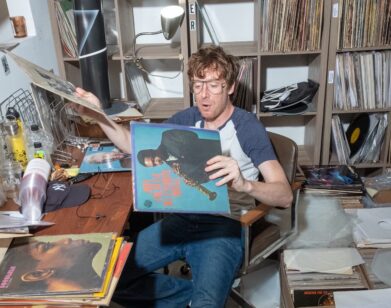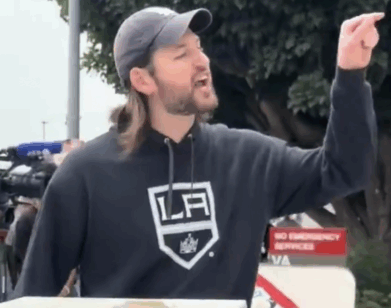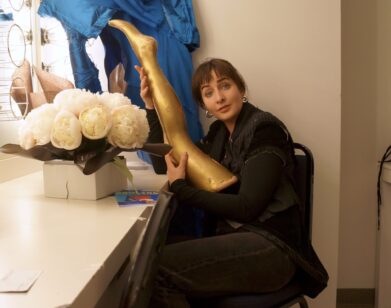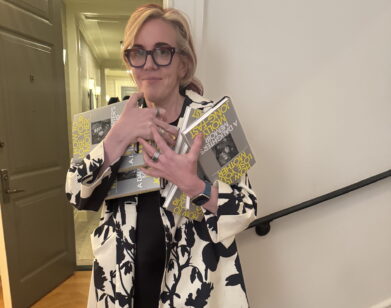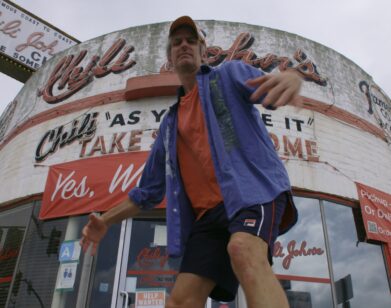Elizabeth Reaser is Still Learning
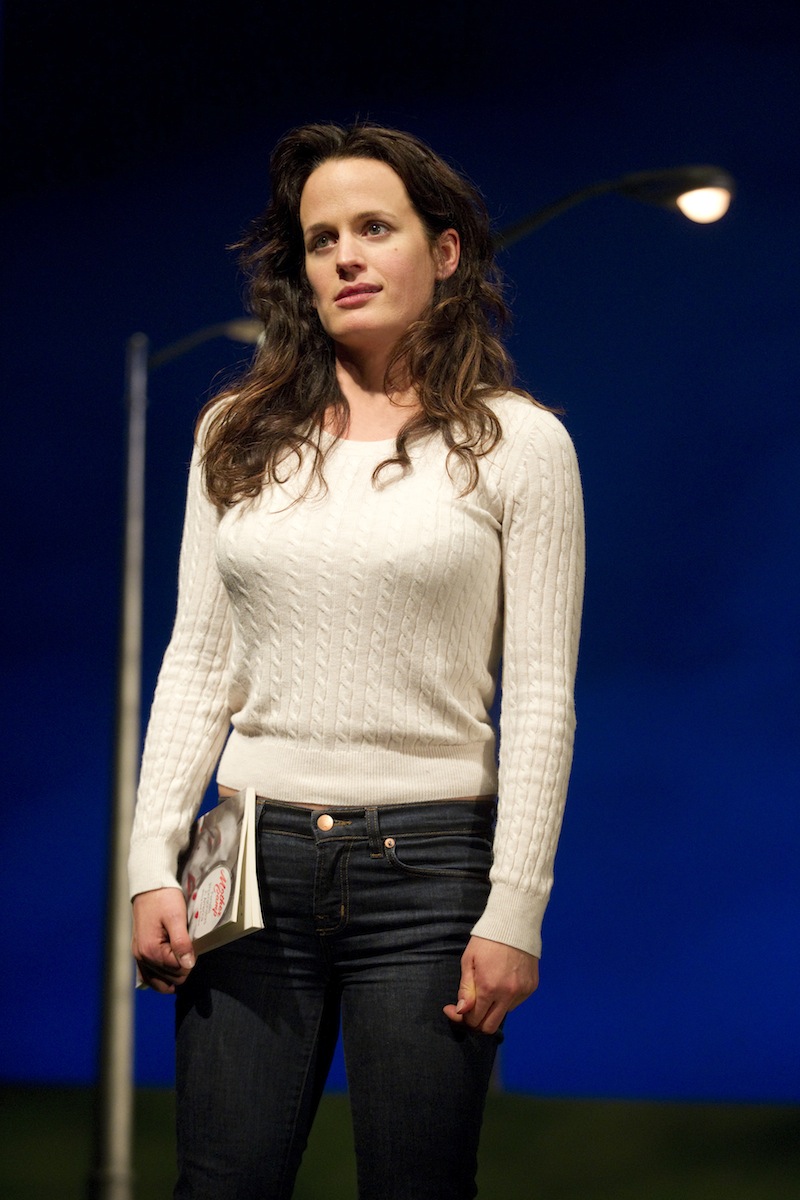
ABOVE: ELIZABETH REASER IN HOW I LEARNED TO DRIVE
The family dynamics, sexual relationships, and dark and uncomfortable secrets of How I Learned to Drive mark a powerful return Off-Broadway after 15 years. Sharp and perfectly developed, the Pulitzer Prize-winning play by Paula Vogel sets driving lessons between a young woman named Li’l Bit (Elizabeth Reaser) and her Uncle Peck (Norbert Leo Butz) as the foundation for an inappropriate affair. The intimate details of the story are exposed by tender characters with blunt honesty as they seem to scramble for self-control. As Li’l Bit matures from child to adult, Reaser’s innocent sweetness transforms into something warm, commanding and real.
Reaser has been in hit TV shows like Grey’s Anatomy (earning a Emmy nomination for her guest role), is hottie vampire mother Esme Cullen in the Twilight movies, and was brilliant in Young Adult alongside Charlize Theron and Patrick Wilson. Interview spoke with Reaser about coming back to the stage, what attracted her to the role, her complex and sometimes confused character, Li’l Bit, and how cool it is to play the drums.
MERYL CATES: I saw the play Wednesday night. You were wonderful. How does it feel to be back on the stage? It’s been some years since The Winter’s Tale [in 2003].
ELIZABETH REASER: Yeah, it feels pretty intense. I mean, it’s scary, and it’s been really nerve-wracking. Luckily, I’ve had Norbert to lean on, and he’s an amazing actor and really takes care of me out there and has been so supportive throughout the process. And the more we do it, the more confident I feel in it, but it was definitely a shock to the system the first time I went out there.
CATES: There’s such an openness and, especially in How I Learned to Drive, rawness with theater. Is there a way that you prepare yourself for the experience day in and day out?
REASER: You try to go about your business and just be normal, but for me, all day there’s an awareness that you’re going to be doing that in the evening or a matinee and there’s this certain way in which you live inside the play, I think. Not to be Method or whatever it is, it’s just you’re so inside it for so long that you rehearse for weeks, and in theater, you only have one day off. So, you don’t really ever get away from it, it kind of gets inside of you in a way. You live inside of it. It’s a really weird place to be as a person, because I don’t feel entirely connected to my real life as much right now because I’m so much connected [to the show].
CATES: You’ve been in previews for a little over a week now, so what has that process been like? Has it been a continually evolving process, building off the evening before? You’re obviously still in rehearsals.
REASER: Yeah, that’s been a real challenge, honestly, going to rehearse during the day because you’re exhausted, and we want to feel like were not thinking about notes, we want to just be in the play. So, I think that’s a challenge. I love, love, love to rehearse, but when you’re rehearsing and then you go do it at night, it’s a very weird thing, because you’re incorporating all these new things. Last night, for me, was a rough show, because we had changed a bunch of things, and I didn’t feel as connected to the ideas that we were playing around with. So you’re basically experimenting in front of an audience, and that can be really intense.
CATES: So, what attracted you to this play?
REASER: Well I think it’s one of the great American plays. Its one of those plays that will be done forever, and it’s timeless. I think it, for me, has so much heart and so much love. And the thing that I was most blown away by is, I don’t really know anything about this subject. I mean, when I think of pedophilia or molestation I just am very—I just find that a really upsetting subject and I have a real judgment about it. And what this play has done has illuminated something for me that I don’t think any other play or movie has. It illuminates a relationship between two people, and it really makes it impossible to judge it, which I think is the most powerful thing [Paula Vogel] can do as a dramatist, is to make it impossible for us to judge or to argue about it. I have both ways of feeling about this relationship. So I’m also really moved by the idea of these people connecting with each other more than they connect with anyone else in their world and they ever will in their life. This is it for them, and unfortunately, it also has an element of abuse that’s traumatizing in ways. And yet she comes out the other side. There’s all this hope and humor and love and I think it’s just a perfect piece of writing.
CATES: It’s such rich writing, with so much context and metaphor. At one point, Uncle Peck says to Li’l Bit that you have to be in control of the car, and she is so not in control of her car or her life at some points. So, how did you tap into the complexities of Li’l Bit’s life?
REASER: You know, I think the play does so much of the work for you. It’s a really great play. In a way, you’re taken care of, because she carries us along with the words and the story, but for me it was mainly just falling in love with Uncle Peck. I mean that’s really all I have to do, and then the fun for me is getting to play her at all different ages, because obviously that’s not something you can do in movies, and yet it’s the most fun thing I’ve gotten to do in a while. To go back and fall in love for the first time or remember what it was like to be this teen, 13 and 17, and those ages that were so rough and exciting and fun and impulsive, I’ve gotten to play around in.
CATES: You play Li’l Bit at many different ages, like you said. How did you dive into those ages and discover those mannerisms in yourself? You’re playing an 11-year-old and a 13-year-old—how did you go about that discovery?
REASER: Mostly I work really unconsciously, and I think if the scenes are really well written, which they are, and if I just throw myself into it, I don’t really think about it. I more explore it and I just do it, just over the course of rehearsing and just using my imagination and remembering back to those times in my life and also knowing kids. I meet a lot of young girls because of Twilight, so I’m around kids. I think from there, I work intuitively, I just jump in. If I start getting heady about it, I think it would feel very false to me. So I just really try and play the scene.
CATES: How has it been working so closely with Norbert Leo Butz? What has gone on behind the scenes, into building that relationship?
REASER: Well Norbert is one of those people that I think everyone is just in love with him. [laughs] He’s just the most charming and kind and open, charismatic, wonderful person. It’s made it really easy for me—he’s become Uncle Peck to me. I feel connected to him in this weird little world that we’ve created and I think that just happens over time and rehearsal. And I’m sure anyone that works with him would feel that way. I just feel incredibly lucky.
CATES: This character is so different than say the character that you played in Young Adult, and if we can just talk movies for a minute, Beth Slade was just so mature and grounded and compassionate, especially next to Charlize Theron’s Mavis, who was so mangled. How did you know that role in Young Adult was right for you?
REASER: When I read it, I sort of knew that it was a good role for me. I get cast a lot of times in movies with nice people, for some reason, because I have a nice face or something. [laughs] I mean, it’s lucky I’m nice. Usually nice people in movies can be really boring, and I thought this was not boring and this was a real person who has her own life and was actually cool, and, like you said compassionate, and probably the most compassionate person towards Mavis in the movie. But mostly I just wanted to work with Jason [Reitman] and Diablo [Cody] and Charlize [Theron] and all those great actors. If you can get into a Jason Reitman movie, that’s just what you do.
CATES: [laughs] Yes that was such a great movie. And in that movie, you were in a mom band. Do you actually play the drums?
REASER: I would love to. I mean, they taught me how to play, they got me a teacher, and it was the most fun thing ever. I finished it and I was like, “What am I gunna do, play the drums by myself?” [laughs] I need a band.
CATES: [laughs] Drums are tough, and you have to look really cool while doing it.
REASER: Oh yeah, they are really hard. It’s hard, but it is cool. Once you do it, you look really cool.
CATES: Back to the play—there are some moments of humor in the show, and on Wednesday night, the audience was really laughing. Because of the set design, you are so close, really on top of those first few rows. How have the audiences been so far? Receptive?
REASER: Yeah, they’ve been great! We’ve had full houses and they’ve been amazing. We’ve had all different ages. That seems to help. They’ve been giving us a lot of great energy. That’s kind of what you feed on in a way. And for me, I have a really intimate relationship with the audience; I mean, I need them, in a way. I need them to hear my story and I need to explain to them how I learned to drive, basically, so I can tell them the secret of my life. So it’s been incredible in that sense, I feel actually very intimate with them.
CATES: It’s a great space for that too, that intimate space.
REASER: They are close, man; like if someone starts opening a piece of candy in the front row, they might as well just be on stage opening it. It’s amazing I can see and hear everything that’s happening.
HOW I LEARNED TO DRIVE IS NOW IN PREVIEWS AND WILL OPEN ON FEBRUARY 13. FOR TICKETS AND INFORMATION, VISIT 2ECOND STAGE THEATRE.

